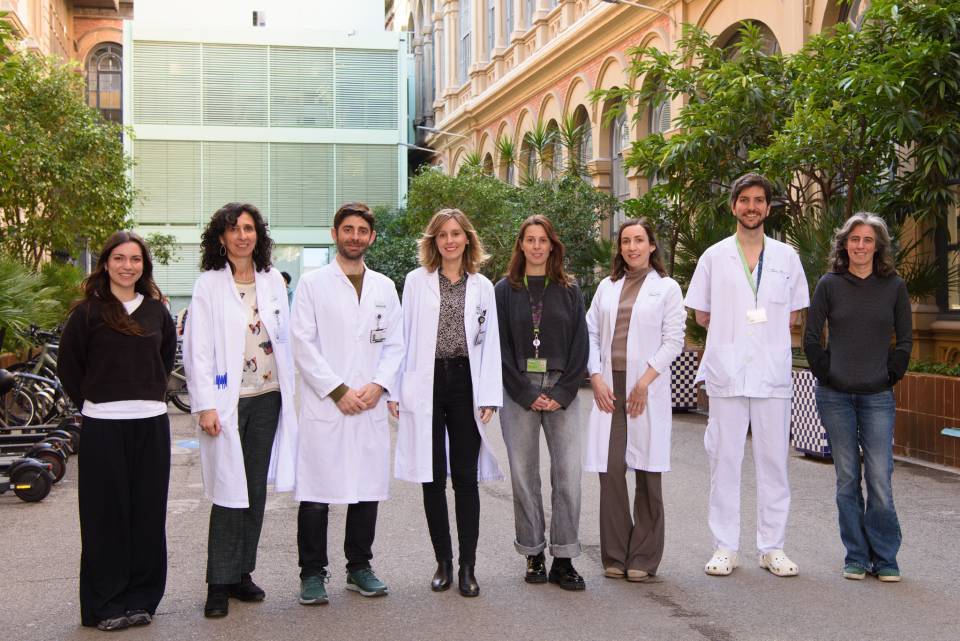Lynch syndrome is the most frequent hereditary cause of colorectal and endometrial cancer. It is caused by mutations that affect the DNA repair system. Alterations in this system cause genetic instability, promoting the accumulation of multiple DNA mutations. These mutations generate altered proteins called neopeptides, which can be recognised by the immune system. This makes neopeptide-based vaccines a promising strategy for preventing the development of cancer in people with Lynch syndrome.
Now, a study led by IDIBAPS-Hospital Clínic and published in the Journal for ImmunoTherapy of Cancer has identified 24 neopeptides that could be good targets for designing preventive cancer vaccines in people with Lynch syndrome. The results show that the selected peptides are repeated among many patients with Lynch syndrome and can activate an interferon-type inflammatory response, which is key to triggering effective immune action.
According to Cristina Bayó, a researcher in the IDIBAPS research group Immunogenetics and immunotherapy in autoinflammatory and immune responses and the first author of the study, ‘Neopeptides are ideal targets for preventive vaccines, since the immune system has not built up any prior tolerance to them, so it can recognise them as foreign. The broad coverage among people with Lynch syndrome and the ability of the 24 neopeptides that we have identified to activate the immune system make them ideal targets for designing new preventive vaccines’.
Conducted by IDIBAPS-Hospital Clínic Barcelona with the collaboration of professionals from IDIBELL and CIBERONC, the study analysed typical mutations of Lynch syndrome that give rise to neopeptides. The team confirmed that these neopeptides are present in samples of colon and endometrial tumours taken both from people with Lynch syndrome and from people with other, non-hereditary cases, as well as in cell lines. Furthermore, the neopeptides’ immunogenic capacity was evaluated in T lymphocytes extracted from tumours.
According to Francesc Balaguer, a researcher in the IDIBAPS research group Gastrointestinal and pancreatic oncology, the head of the Gastroenterology Department at Hospital Clínic Barcelona, a member of the CIBEREHD network and the project leader, ‘This study paves the way for the development of vaccines based on these neopeptides to strengthen immune surveillance and prevent the development of tumours associated with Lynch syndrome’. Daniel Benítez-Ribas, a researcher in the IDIBAPS research group Immunogenetics and immunotherapy in autoinflammatory and immune responses and the co-principal investigator of the study, says, ‘The results establish the basis of a clinical trial that is about to begin at our centre. Based on dendritic cells, the trial will assess the safety and efficacy of this new immunopreventive vaccine’.
The study was made possible with the support of the Association of Families with Lynch Syndrome (AFALYNCH) and grants from Instituto de Salud Carlos III (PI19/01867, PI22/00470, ICI22/00063), co-financed by the European Union, and the 2022 ‘Emili Letang Josep Font’ clinical research contract. Cristina Bayó received support from Fundació ”la Caixa” (CP042702/LCF/PR/GN18/50310007).
Reference article
Bayó C, Castellano G, Marín F, et al. Discovery and validation of frameshift-derived neopeptides in Lynch syndrome: paving the way for novel cancer prevention strategies. Journal for ImmunoTherapy of Cancer, 2025;13:e011177. doi: 10.1136/jitc-2024-011177




